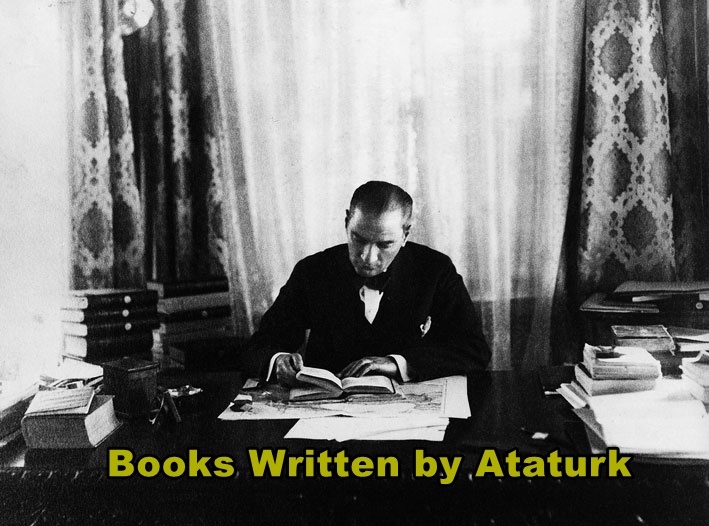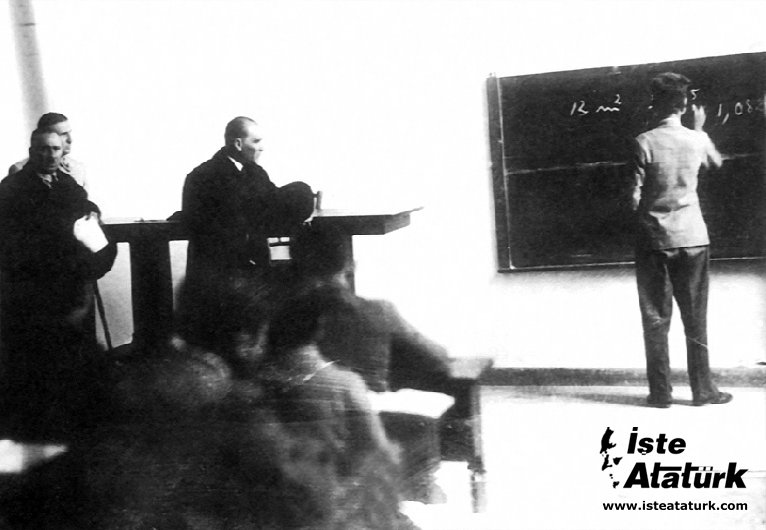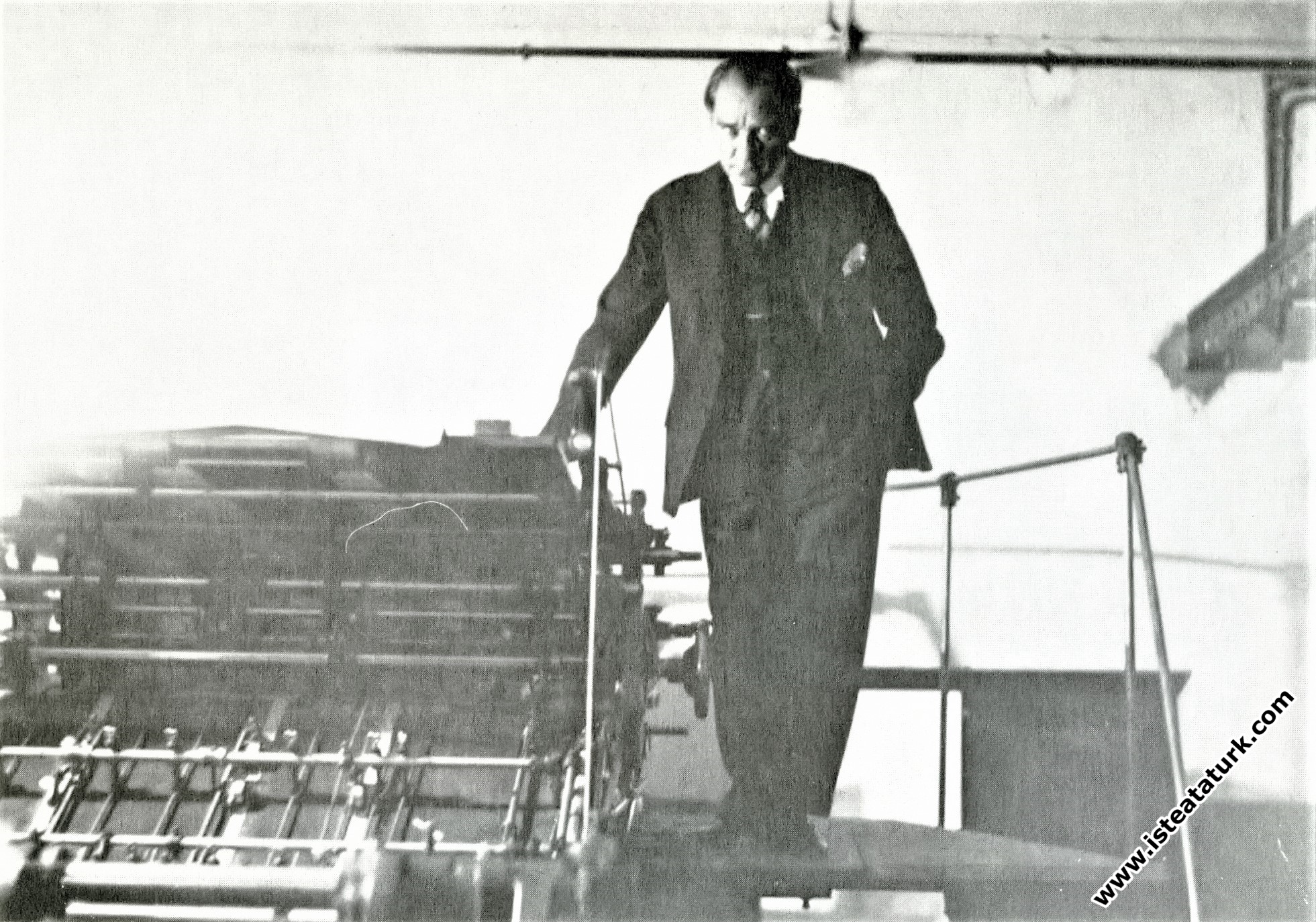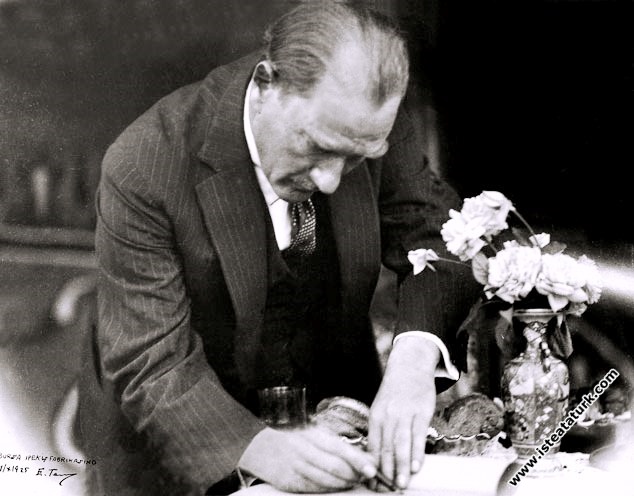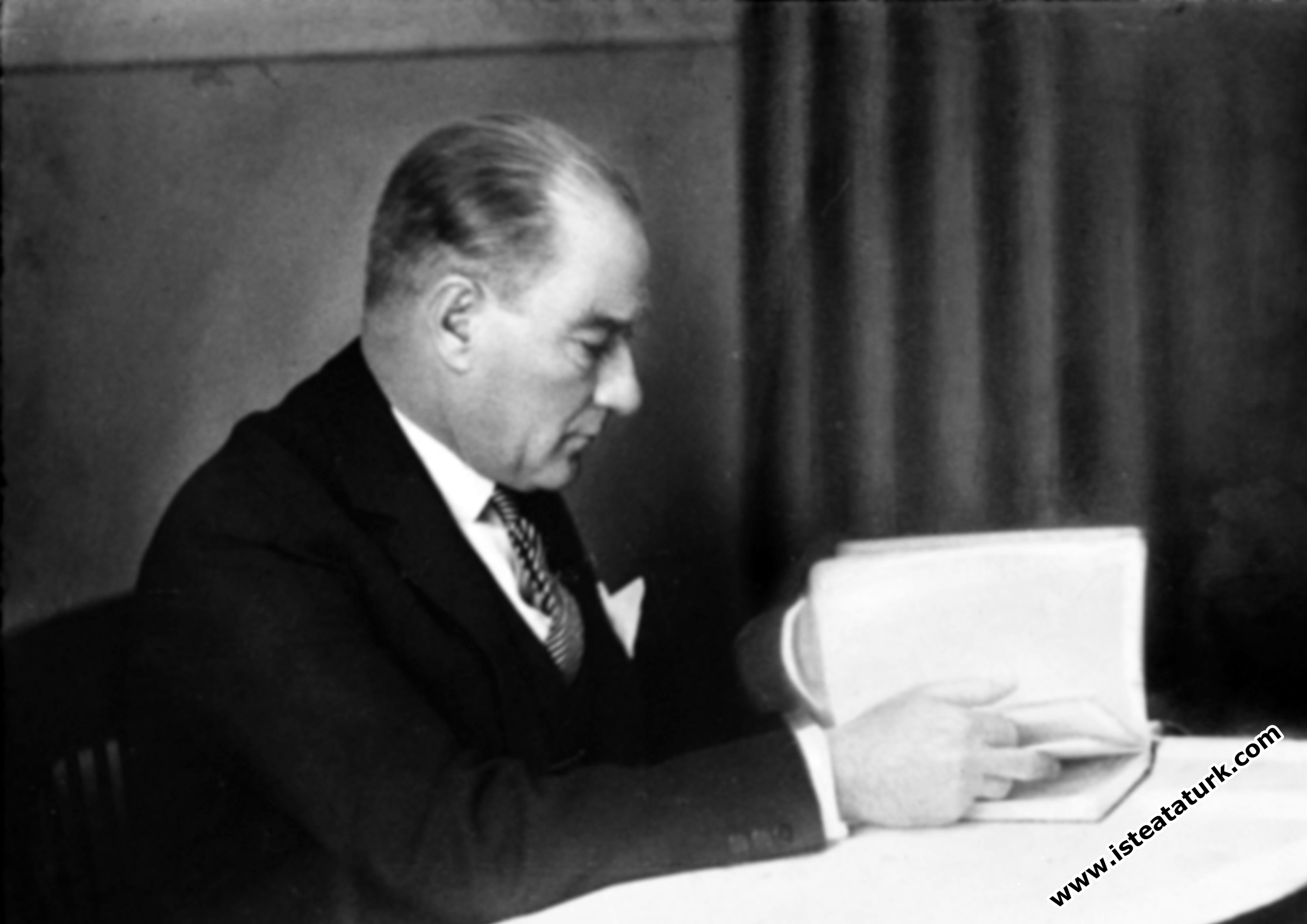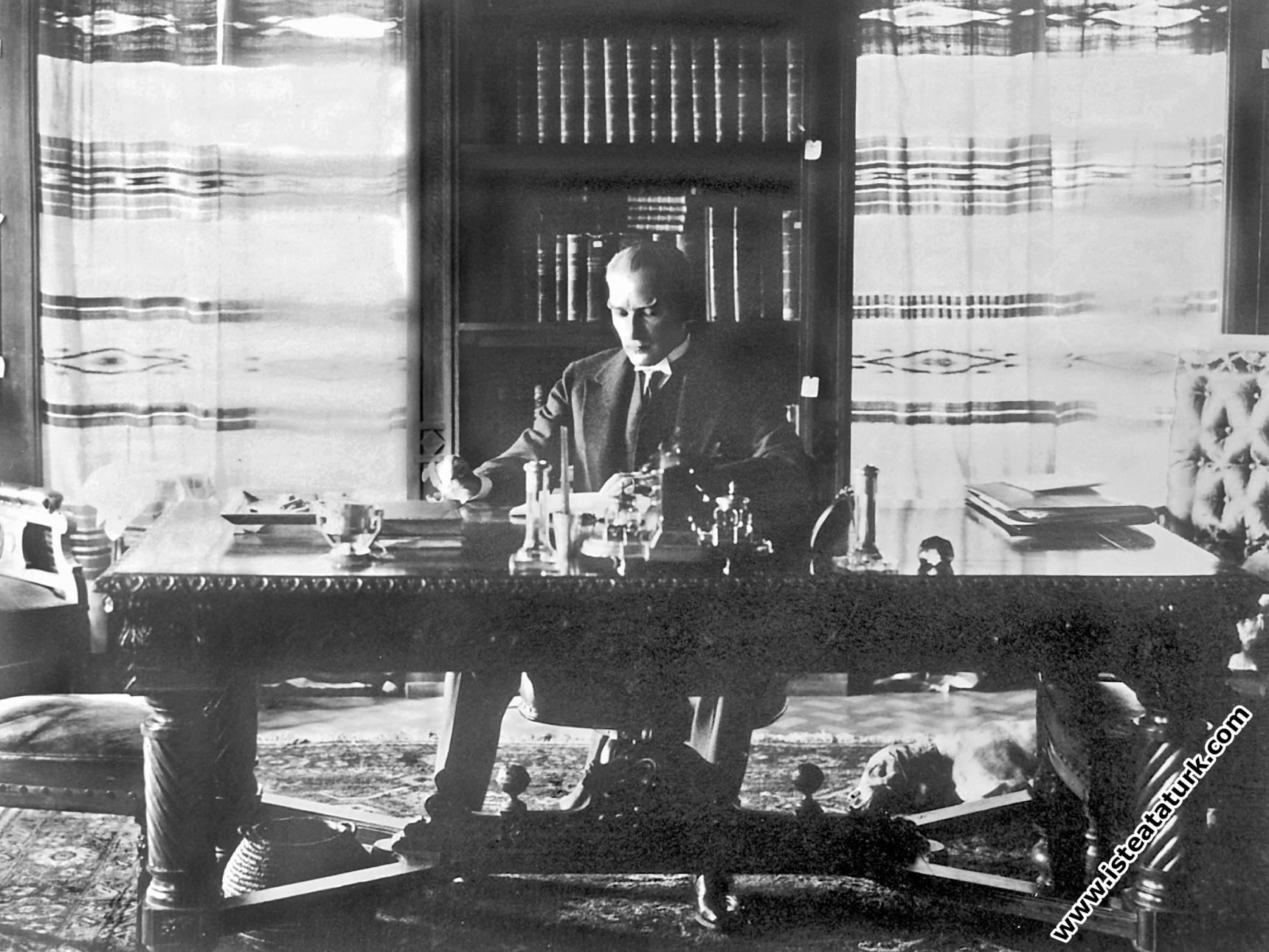
Mustafa Kemal's Relationship with the Press and the Minber Newspaper
Character Size
Mustafa Kemal's Relationship with the Press and the Minber Newspaper
MUSTAFA KEMAL'S RELATIONSHIP WITH THE PRESS AND THE MINBER NEWSPAPER
Summary
Mustafa Kemal Pasha, who knows very well that the press is important in the life of society and in raising the awareness of the society, has given great importance to the press since the beginning of the National Struggle.
Mustafa Kemal Pasha, who is closely interested in the press, is among the partners of Ali Fethi (Okyar) Bey and Minber newspaper. Minber newspaper started its publication life on November 1, 1918, it was published every day and made its last publication on December 22, 1918.
Minber newspaper, which entered the press life in a mixed and tense period, shed light on the political developments in that period. In addition to political developments, there are articles that deal with the economic and social situation of the society.
There are also news about Mustafa Kemal Pasha in the newspaper. There is news about his arrival in Istanbul on 13 November 1918 and his meetings with the sultan. An article titled "Interview with Mustafa Kemal Pasha" was published in the 17 November 1918 issue of the Minber newspaper.
In addition, there are some debates that the articles published under the pseudonym Hatib in the Minber newspaper belong to Mustafa Kemal Pasha.
Entrance
Much has been written throughout history to indicate the importance of the press in society. What has been written and said so far shows that the press is one of the main efforts of contemporary society. Because the press is the oldest and most effective means of communication. Mustafa Kemal Atatürk defined the importance of the press as "the common voice of the nation" and completed this definition as follows: "To illuminate a nation and to provide the food that a nation needs, in short, to ensure that the goal of a nation is happiness, and to walk towards the common ground, the press itself. a force, a school, a guide” 1. It is clear that the press has a great importance in the life of the society and in raising the awareness of the society. Knowing this fact very well, Mustafa Kemal Pasha gave great importance to the press from the beginning of the National Struggle, and endeavored to create a national press during the War of Independence 2 .
Mustafa Kemal's warm interest in newspapers, journalists and journalism was undoubtedly due to his interest in rhetoric and writing, as well as the roles and functions played by newspapers in forming public opinion, informing and directing the masses realistically 3 . Knowing the importance of the press in influencing the public, Mustafa Kemal's relationship with the press started with a few friends during his student years .It began by secretly publishing a newspaper. The aim is to explain the failing aspects of management. Mustafa Kemal explains the reasons for embarking on this job as follows: “I was studying well in the usual lessons. Above (above) these, new ideas appeared in me and some of my friends. We began to discover that there were evils in the administration and politics of the country. We were eager to tell the students of the Military Academy, which consisted of thousands of people, about our discovery, and we established a handwritten newspaper in the school to be read among the students of the school .. Mustafa Kemal's interest in the press, which started in the Military Academy years, and thus in telegraphing as an effective means of communication at that time, increased gradually both during the war and the Republic, and it is seen that he made efforts to involve the nation in the national cause and to create public opinion. Not content with this communication network, Mustafa Kemal, as it is known, not only supported Albayrak newspaper during the Erzurum Congress, but also started publishing the İrade-i Milliye newspaper in Sivas, which would become the voice and semi-official organ of the national movement as of September 14, 1919, with the end of the Sivas Congress. He also wrote some editorials himself. In addition, one of the first attempts Mustafa Kemal made, right after he came to Ankara on 27 December 1919, with a few members of the Representative Committee, was to publish a newspaper.6 .
Knowing very well the impact of the press on society, Mustafa Kemal Pasha is among the partners of Fethi (Okyar) Bey and Minber newspaper 7 . The friendship of Fethi (Okyar), who jointly publishes a newspaper, and Mustafa Kemal is a sincere friendship of cause and struggle since their youth. This deep-rooted cause and struggle union between Atatürk and Okyar started during the War Academy; It continued in the ranks of the Committee of Union and Progress, on the Tripoli and Balkan fronts 8 .
The pulpit means "the lectern in mosques where the orator comes out and delivers a sermon" .. In his memoirs, Fethi Okyar says the following about the Minber newspaper: “Before I resigned from the Ministry of Internal Affairs together with the cabinet, Mustafa Kemal Pasha, whose official duty was the "Foreign Commander of the Army under the Ministry of War", said: "Even if Izzet Pasha remained in power, the opposition He will not be able to withstand the pressure, and the Sultan will definitely have the Unionists in the cabinet liquidated. The attacks and destructions that devastated the country and were committed under the name of opposition are mostly done through newspapers. The best means to awaken the nation against them is to respond in the same way, that is, to publish a newspaper. I have some money saved from my salaries. I'm ready to put it. I'm a soldier.. I can't take concessions.. You are generally excluded from most of the justified criticisms today, even come to tell our enemies,
I can honestly admit: I never thought of publishing a newspaper until I received an offer from Mustafa Kemal with such a justification. Mustafa Kemal also found a name for the newspaper: MINBER 10 . However, Prof. The determination made by İzzet Öztoprak is very appropriate and correct. Fethi Bey is mistaken in the stories about Mustafa Kemal. Because the name of the newspaper was determined as Minber before Mustafa Kemal's return to Istanbul and the newspaper entered its publication life as of November 1, 1918. Therefore, it is not correct for Ali Fethi to state that the name of the newspaper was determined by Mustafa Kemal 11 .
Mustafa Kemal, on 7 August 1918 VII. He was appointed to the 12th Army Command . On October 31, 1918, Liman Von Sanders Pasha, who was the Commander of the Lightning Armies Group on the Syrian Front, transferred his duty to Mustafa Kemal Pasha upon learning that an armistice was signed between the Entente Powers and the Ottoman Empire . . The Army Headquarters was abolished and Mustafa Kemal was given the command of the Ministry of War 14 . This development was announced in the 11 Teşrin-i Sani 1334 issue of the Minber newspaper, under the heading "Mustafa Kemal" in "Internal Information", with the statement "The Lightning Army Group and the Seventh Army Headquarters were abolished and the Seventh Army Commander Mirliva Mustafa Kemal Pasha was given to the Ministry of War".15 . It was published in the Minber newspaper on 14 November when Mustafa Kemal arrived in Istanbul on 13 November. When he got off the train in Haydarpaşa on 13 November 1918, he encountered the enemy navy that arrived in Istanbul on the same day, and Mustafa Kemal Pasha, who watched the enemy navy with sadness, showed no signs of intimidation and said, "They will go as they came," and that he would one day be expelled from the country . expressed his confidence in 18 .
In the newspaper dated 16 Teşrin-i Sani, “Naval Minister Ali Rıza Pasha, Adjutant Fahri-i Hazret-i Shahriar Yıldırım Army Group Commander Mustafa Kemal Pasha, General Chief of Military Staff Kazım Pasha and Istanbul Guard Ahmet Fevzi Pasha Mahfil It was stated that Mustafa Kemal Pasha stayed in Huzur-ı Hümayun for a long time, by saying, "They have been honored to be accepted to Huzur-ı Şahane separately in the Imperial-i Hümayun.
The acceptance of Mustafa Kemal Pasha to Huzur-ı Hümayun for the second time was written in the newspaper dated 30th Teşrin-i Sani under the title of Internal News.
Mustafa Kemal, who stayed in Istanbul from 13 November 1918 to 16 May 1919, carried out some activities in Istanbul 19 . In these activities, he mainly wanted to form a government, if not, to become the Minister of War or to enter the parliament as a deputy. In addition, another activity during his stay in Istanbul was to seek solutions by meeting with the representatives of the Entente States. Mustafa Kemal plans to stay away from the suspicions of the British by taking a side with the British through the press. He talks at length about the goodwill and friendship the British showed to the Ottoman nation 20 .
Mustafa Kemal Pasha, who came to Istanbul, had three to five thousand liras, which he had saved from his salary. Mustafa Kemal Pasha, who lost an important part of this money, which he wanted to buy a house for his mother, by putting him into a trade business, invested and added the last part of his money to the capital of the newspaper he founded with Ali Fethi Bey 21 . Falih Rıfkı ATAY writes the following on the subject: “... Fethi Bey is at the head of the newspaper. Mustafa Kemal is among those who invested a small amount of capital.
This new trade is downright sweet. You will write, you will have it printed, you will have arguments, and you will also earn money.
What is a newspaper client? What percentage of those who buy a newspaper read serious articles, and what percentage are in search of curious news and episodes. Mustafa Kemal has no idea about these. He thinks that there is a smarter editor than Fethi Bey in the newspapers of that day, who can give better polemical inspirations than him, then is it not natural that the version of this newspaper is higher than all of them?
... Yes, journalism is also a trade, but it is a trade that even an intellectual does not understand as much as fig and grape shopping!
... A newspaper boat won't last as long as a fig boat. Whatever is left of his life as a commander, this newspaper, which has no reason not to be exiled, melts away” 22 . Mustafa Kemal says that his partnership with this newspaper was his first and last journalism in his life, and that it ended in failure 23 .
The official records of the concession declaration given to the General Directorate of Press by Ali Fethi Bey for the publication of the newspaper are as follows: “Name: Minber, Locality: Dersaadet, The subject to which it will refer: Political, scientific, literary, scientific and economic. Evkat-ı Publication: Journal, Language: Turkish, Name of the owner: Istanbul Deputy Ali Fethi Bey, Name of the Director-i Responsible: Dr. Feritköy resident. Mr. Rasim Ferit.
It is informed that a declaration has been submitted to the General Directorate of Press for the newspaper explained in the ballad.
1 Law Before 1334
Stamp and Signature of Mehmet Salih
Seal” 24 .
Former Finance Minister Cavit Bey met with Fethi Bey about the Minber newspaper. Fethi Bey said that the newspaper, whose capital was partially provided by Mustafa Kemal Pasha, made a loss. Cavit Bey also told the newspaper that he would find money 25 .
After the First World War, after the Armistice of Mudros signed on 30 October 1918, the latest issue of the Minber newspaper, which was published on 1 Teşrin-i Sani 1334 (1 November 1918), Friday 26, was 22 Kanun-u Evvel 1334 (22 December 1918). ) It was released on Sunday 27 . Minber newspaper, which started its publication life on November 1, 1918, defined itself as a "political, scientific, literary and economic journal". The concessionaire of the newspaper is Doctor Rasim Ferit (Talay). The publisher of the newspaper, Dr. Rasim Ferit (Talay) Bey was born in Tripoli in 1888 and is the son of Mehmet Ferid Pasha 28. Dr. Rasim Ferid (Talay)'s meeting and friendship with Mustafa Kemal (Atatürk) is not from the military. According to Fethi Tevetoğlu's determination, Mustafa Kemal - Dr. The closeness and relationship between Rasim Ferit started in the 1910s and continued uninterruptedly until his death 29 .
While Mustafa Kemal Pasha was out of Istanbul, when he needed to communicate with high authorities and figures in the capital on some important issues, he sent his written and verbal messages to his trusted friend, Dr. He sent it via Rasim Ferid 30 .
Hakkı Tarık Us, stating Rasim Ferid Talay's relationship with the press and especially with the Minber newspaper, which Atatürk published jointly with Okyar, writes:
“The relation of our doctor, who specialized in pediatric surgery and orthopedics in Paris, to the press begins when his father was the Governor of Görece. The letter correspondence of the poet Sadık Vicdani from Kastamonu to Ferid Pasha of Lofca becomes the cradle of the press for Rasim Ferid. The little lines signed by the poem “Ferid Paşazade Rasim” in the journal Children's Guide published in Thessaloniki were laying the groundwork for the dear doctor to establish the first Minbar in Istanbul.
You know, Rasim Ferid, who remained in the footsteps and orders of Atatürk throughout his life, was raising this pulpit for the Çanakkale hero Mustafa Kemal to call out to the country.
After that, Rasim Ferid, with whom we met frequently in the Ileri Newspaper, kept trying to solve one of the most important cases of tomorrow, the nature enigma called the soul, in his "Yarn Magazine".
Doctor, the youngest in our jubilee party, I think, will bring us fresh works from the spirit realm science that he is very familiar with.” 31
Although Mustafa Kemal wrote his work “The Officer and Commander ile Hasb-i Hal” in 1914 when he was an Attaché (military attaché) in Sofia, for some reasons, it was only able to be published in the Minber Printing House in Istanbul in 1918, four years later. As quoted by Ruşen Eşref Ünaydın, “As I learned from Doctor Rasim Ferit Talay, it was printed in one thousand copies at the request and order of Mustafa Kemal Pasha, and each copy was put up for sale at a price of 7.5 kuruş. Pasha bought some of them as gifts to his friends. The rest was collected and destroyed by Damat Ferit, after Pasha went to Anatolia and his relations with the Babylonian military service were cut off...” 32
An article titled “Interview with Mustafa Kemal Pasha” was published in the issue of the Minber newspaper dated 17 Teşrin-i Sani 1918. At the beginning of the article, extensive information is given about the previous duties of Mustafa Kemal. In this interview, Mustafa Kemal expressed his thoughts about the country. “I accept that the best policy is to be the strongest in every sense of the word. What I mean by being the strongest, do not think that it is only the strength of the weapon. Although I am a bi'l-akis soldier; I think it is the last of the people who created the power analysis. What I want is to be strong spiritually, scientifically, physically and morally. Because even if we assume that all members of a nation deprived of this achievement I have mentioned are equipped with the latest weapons, it cannot be right to accept that it is strong. Of course, it is not enough to be a weapon in order to be a human being in today's society as a human being. In my opinion, the meaning that should be understood when a strong army is said; Every individual, bi'l-hassa officer, commander realizes icabat-ı mediya and science and applies his actions and actions in accordance with it. High morality is also a delegation. There is no doubt that this delegation, whose sole purpose and duty, thought and preparation is reserved for the defense of the homeland; The state becomes operational with the final decision of those who administer the politics of the country. As a soldier who commanded the army and armies, I may have touched politics from this point of view. As I know my country and my nation very well and I am convinced that it is necessary to work very continuously with peace and tranquility in order to achieve the progress it needs, but in any case without freedom and independence, this will satisfy my opinion, that is, peace and quiet and time-distance for us. I am seriously in favor of friendships that lead to relations that will bestow ”. When the reporter asked his opinion about the British,
When the reporter asked about the latest intellectual currents in the country, he did not comment on this issue as he had just arrived from the front 33 .
Fethi Okyar said the following about this interview in her memoirs: “The political-military series of articles by Mustafa Kemal, which appeared in the form of an interview-interview in the Minbar on November 15, for the atmosphere of his speech with Sultan Vahdettin, is remarkable both as the idea it conveys and as the real conditions of those days. The broad summary of these articles is in the famous French newspaper Le Temps, “What does the Commander of the Çanakkale Battles think about the future of his homeland in today's conditions?” appeared under the title. In this interview, Mustafa Kemal focused on the application of the seventh article of the Armistice of Mudros, which gave the victors the right to occupy the places they deem necessary for peace and tranquility, and gave examples of the failure to comply with this condition. He implicitly said that the most sacred right for a nation that has been wronged is the struggle to prove its existence at any cost.34 .
Mustafa Kemal's visit to Abdullah Pasha, who was the Minister of War of the Tevfik Pasha government on the 17th of Teşrin-i Sani, took its place in the next day's newspaper 35 .
Mustafa Kemal was also praised in the article titled “Nühüfte Bir Face” published in 19 Teşrin-i Sani by Ahmet Hulki. “Let's admit, one of the few intelligence-wise exceptions that did not show mercy in raising the country's precedent, and even the first one is Mustafa Kemal Pasha, whose statement was published in the newspapers "Minbar" and "Zaman" and "Vakit" 36 . Although he is one of the most benevolent sons of the nation and the country, he is the one who has the least appreciation.” The article ends with the following sentences: “In any case, the future homeland is right to expect great services from Mustafa Kemal Pasha” 37 .
In addition, there are some debates that the articles published under the pseudonym Hatib in the Minber newspaper belong to Mustafa Kemal.
Three editorials appeared in the newspaper under the pseudonym Hatib. With the editorials titled “Let's Learn From Disaster” in 1 Teşrin-i Sani, “Hürriyet-i Matbuat” in 2 Teşrin-i Sani, and “Sulh u Salah” in 4 Teşrin-i Sani, 2 Teşrin-i Sani' The article titled (Asrification), which is about Ziya Gökalp's work titled "Turkification, Islamization, Contemporaryization", which appeared in serial form on the 6th, 8th and finally 9th Teşrin-i Sani, starting with the 19th century, are the articles published under the pseudonym Hatib. It has been stated that this article, titled Asrileşmek, belongs to Mustafa Kemal because he made a lot of effort to modernize in the following years, and this is the result of this article. 38 Fethi Tevetoğlu states that as a result of a long and detailed analysis of this four-day serial, which came out under the title of Modernization, the style in the article, the subject covered, the view of "Contemporaryization" and other comments will form the basic part of Atatürk's ideal that he will follow throughout his life in the following years39 .
In the article published under the title of "Let's Learn From Catastrophe" in 1 Teşrin-i Sani, it is stated that in these difficult political conditions, it is not desired to cry out for disaster and despair, and that it is necessary to strive for a new life based on the motto "One misfortune is better than a thousand advice". .
In the article titled “Hürriyet ve Matbu'at” in the issue dated 2 Teşrin-i Sani 1334, the freedom of the press is an indivisible part of both constitutionalism and civilization, provided that the high interests of the country are not touched, that the press cannot be put under government pressure; It is explained that there is a need for progress in the field of pen and idea 40 .
In the article titled "Sulh u Salah" published in the newspaper dated 4 Teşrin-i Sani, it was stated that when the armistice was signed, peace was expected and that it would be done soon, and it was stated that the Ottoman country should heal the wounds of the war.
When we look at these articles and the serial called "Asrileşmak" in general, we see that the language is written in a slightly heavier and thicker Ottoman Turkish. There are debates about who owns the articles published under the pseudonym Hatib. However, it is not yet certain.
The last of the articles published under the pseudonym Hatib was published on the 9th of Teşrin-i Sani. Therefore, it is understood that these articles do not belong to Mustafa Kemal chronologically. Considering the conditions of that time, it does not seem possible for him to send these letters by telegram from Adana every day. In addition, Mustafa Kemal came to Istanbul on November 13, 1918 and remained in Istanbul until May 16, 1919, so he was in Istanbul on December 22, 1918, when the newspaper was closed. If he had used the pseudonym Mustafa Kemal Hatib, he might have used this pseudonym in the articles and editorials published after 13 November, but such a pseudonym is not found. Fethi Tevetoğlu explains this issue as follows: Since Mustafa Kemal was a soldier and was very careful not to be involved in any political polemics, he wrote articles under the pseudonym Hatib in the first days of the newspaper. However, the violent attacks of Celal Nuri from Ati newspaper and Ali Kemal from Sabah newspaper prompted Mustafa Kemal to act more cautiously. The fact that the signature of Hatib was not found in the editorials after the fourth day is due to the fact that Mustafa Kemal Pasha was a soldier and did not want to get involved in polemics personally, even under his pseudonym. If this pseudonym belonged to a civilian other than the editorial staff of the newspaper, there would be no harm in its continuation. However, the violent attacks of Celal Nuri from Ati newspaper and Ali Kemal from Sabah newspaper prompted Mustafa Kemal to act more cautiously. The fact that the signature of Hatib was not found in the editorials after the fourth day is due to the fact that Mustafa Kemal Pasha was a soldier and did not want to get involved in polemics personally, even under his pseudonym. If this pseudonym belonged to a civilian other than the editorial staff of the newspaper, there would be no harm in its continuation. However, the violent attacks of Celal Nuri from Ati newspaper and Ali Kemal from Sabah newspaper prompted Mustafa Kemal to act more cautiously. The fact that the signature of Hatib was not found in the editorials after the fourth day is due to the fact that Mustafa Kemal Pasha was a soldier and did not want to get involved in polemics personally, even under his pseudonym. If this pseudonym belonged to a civilian other than the editorial staff of the newspaper, there would be no harm in its continuation.41 .
Sadi Borak, on the other hand, says that we think that the articles written under the pseudonym Hatib belong to Rasim Ferit42 .
Fethi Tevetoğlu, in his article published in Yeni Forum Magazine with the title Atatürk's Pulpit and Minber's Hatibi II, gives detailed information about who the nicknames in the newspaper may belong to. He stated that the writings written under the pseudonym Hatib would definitely be understood to belong to Atatürk when examined in terms of style, and he refutes Sadi Borak's thesis as follows: Dr. There is no record of Rasim Ferit Talay's oratory, neither in the articles written about him, nor in the works on Turkish Hatibs, nor in his activities in the Grand National Assembly of Turkey 43. Therefore, he says that his writings with the pseudonym Hatib cannot belong to Rasim Ferit (Talay). However, Fethi Tevetoğlu, in his book Ömer Naci, which was published in 1987 among the publications of the Ministry of Culture and Tourism, is the author of the articles named "Hatib" found in the editorials of the Minber newspaper, Dr. states that it belongs to Rasim Ferit Bey 44 . Thus, it contradicts itself.
“It is illogical in our opinion to think that Mustafa Kemal Pasha, who was the first to put forward the publication of the newspaper, named it MINBER and contributed money to its capital, did not write an article in this newspaper, in which he himself stated that he published it with the words "to publish our thoughts together". It would be helpful, of course, if the exact answer to questions such as when the decision was made on this job, when it was named and when the money was given is known. However, being unknown does not change Atatürk's close relationship with the newspaper.
However, since he was a soldier and was very careful not to get his name involved in any political polemic, Mustafa Kemal's signature was never found under the articles in MINBER. However, it is appropriate to think that Mustafa Kemal Pasha used a pseudonym just like his other military-writer friends did.” Fethi Tevetoğlu states that the writings under the pseudonym Hatib definitely belong to Mustafa Kemal 45 .
It has been stated that the nickname of Hatib was attributed to the memory of the saint of his friend Ömer Naci46 , with whom they had practiced oratory during his student years47 .
Fethi Tevetoğlu has very interesting approaches on the subject: As it is known, the pulpit is the Arabic name used in our language, also in our language, for the pulpit in mosques where the orator comes out and delivers the sermon. Since Ali Fethi Bey and Mustafa Kemal Pasha chose this name for their newspaper, it is obvious that the Hatib who will go to the pulpit, will address the Turkish nation with his editorial, and will spread his ideas and thoughts, will be one of these two. It is unreasonable for the publishers of the newspaper to welcome someone other than themselves to this position on the first day. What comes to mind is that Ali Fethi Bey, who is famous for his gentlemanliness, gave this office to Mustafa Kemal Pasha. As a matter of fact, during the National Struggle, which they will be thrown in a short time, the Hatib will again be Mustafa Kemal Pasha, who will go up to the pulpit and address his nation 48.
prof. Dr. In the evaluation made by İzzet Öztoprak on this subject, Prof. Dr. Agreeing with the chronological explanation made by Şerafettin Turan, he stated that the writings under the pseudonym Hatib would not definitely belong to Mustafa Kemal49 . In Şerafettin Turan's article titled "M. Kemal Atatürk Cannot Be the Speaker of the Minber Newspaper", he evaluated Fethi Tevetoğlu's dilemma and emphasized that the division called Modernization would not belong to Mustafa Kemal. I think we will find other evidence and suggest some guesses about Hatib's identity," he concluded .. Based on these discussions in the scientific world, there is no certainty about who the writings named Hatib belong to. We have not been able to bring any certainty to this subject with this study, but we believe that the articles will not belong to Mustafa Kemal chronologically.
1 M. Nuri İnugur, Press and Publication History, Istanbul 1982, p.20.
2 Yücel Özkaya, “Press at the Beginning of the National Struggle and Mustafa Kemal Pasha's Relations with the Press”, Journal of Atatürk Research Center, Vol: I, No: 3, July 1985, p. 871.
3 İzzet Öztoprak. “Atatürk, Press and Minber Newspaper”, Fifth International Atatürk Congress (8-12 December 2003), Volume: II, Ankara 2005, ATAM Pub. p.905.
4 Ömer Naci and Ali Fethi are at the forefront of his friends who helped Mustafa Kemal. Fethi Tevetoglu; “Atatürk's Nickname Used in Minber Newspaper: Hatib”, Milli Kültür, Issue: 63, 1988, p. 89.
5 Yusuf Hikmet Bayur Atatürk's Life and Work, Ankara 1990, ATAM Pub. p.12.
6 İzzet Öztoprak agm, p.910-911.
7 Sadi Borak Atatürk and Literature, Kırmızı Beyaz Yayınları, İstanbul 2004, p.92.
8 Fethi Tevetoğlu “The Newspaper Published by Atatürk and Okyar: Minber”, AAM Magazine Vol V, Issue: 13, Ankara 1988. p.183.
9 Ferit Devellioğlu Ottoman Turkish-Turkish Encyclopedic Dictionary, Aydın Publishing House, Ankara 2003, p.649.
10 Fethi Okyar A Man in Three Ages; Arrow. Pleasure. Cemal Kutay, Istanbul 1980, 267-268.
11 İzzet Öztoprak agm, p. 910.
12 Sadi Borak Atatürk and Literature, Varlık Yay., Istanbul 1972, p. 102.
13 Turkish War of Independence I Armistice of Mudros and its Exercise, Gnkur. Arrow. Ankara 1999, p.55.
14 Biographies of the Division and Higher Level Commanders Participating in the Turkish War of Independence, Gnkur. Pub., Ankara 1989, p.3.
15 Minbar, Number: 10, 11 Teşrin-i Sani 1334
16 Minbar, Number: 13, 14 Teşrin-i Sani 1334
17 He met Mustafa Kemal Pasha, who came to Istanbul on 13 November 1918, at Haydarpaşa Train Station. Rasim Ferid Bey is waiting. Fethi Tevetoğlu, “A Person Atatürk Trusted: Doctor Rasim Ferid Talay”, AAM Journal Volume VII, Issue: 21, Ankara 1991. p.632., Yusuf Hikmet Bayur; ibid, p.189.
18 Turkish War of Independence I, p.80., Selahattin Tansel, From Mondros to Mudanya, Vol: I., MEB. Pub., Istanbul 1991, p.75.
19 Mustafa Kemal had the opportunity to meet with the sultan several times during his stay in Istanbul. (On November 15, November 29, and December 20, 1918) For detailed information, see. Sina Akşin, The Governments of Istanbul and the National Struggle, Volume I, The Return to Absolute (1918-1919), İşbank Pub., Ankara 1998.
20 Zekeriya Turkmen, The Situation and Restructuring of the Army in the Armistice Period (1918-1922), TTK Pub., Ankara 2001. p. 121.
21 Fethi Tevetoğlu, agm, Journal of AAM C: V, P: 13, Ankara 1988. p.184.
22 Falih Rıfkı Atay, Çankaya, Istanbul 1998, pp.156-157.
23 Sevket Sureyya Aydemir, One Man 1881-1919 Volume: I, Remzi Bookstore, Istanbul 2003, p. 330.
24 Sadi Borak; Atatürk's Studies in Istanbul (1899-16 May 1919), Istanbul 2004 Kırmızı Beyaz Yayınları, pp.179-180., Fethi Tevetoğlu, “Atatürk's Pulpit and Minber's Orator I”, New Forum, Issue : 229, 1989.p. 27.
25 Zeki Sarıhan, Independence War Diary I, TTK. Arrow. Ankara 1993, p. 36.
26 Gazi Ahmet Muhtar Pasha, Takvîmü's-Sinîn, Prepared by Yücel Dağlı, Hamit Pehlivanlı, Gnkur. Arrow. Ankara 1993, p.553.
27 A.g.e., s. 554
28 Fethi Tevetoğlu, agm, Journal of AAM Volume V, Issue: 13, Ankara 1988. p.185.
29 Fethi Tevetoğlu, agm, Journal of AAM Volume VII, Issue: 21, Ankara 1991. pp.623-624.
30 Fethi Tevetoğlu, agm, Journal of AAM. p.626. For details of correspondence, see With the aforementioned article, Sadi Borak's Private Letters of Atatürk, Kırmızı Beyaz Pub., İstanbul 2004.
31 Fethi Tevetoğlu, agm, Journal of AAM. p.638
Hasb-i Hal with 32 Officers and Commanders; Gnkur. Arrow. Ankara 1981, pp.VIII-XXVIII.
33 Minbar, Number: 16, 17 Teşrin-i Sani 1334, İzzet Öztoprak; agm, Vol: II, Ankara 2005, ATAM Pub. p.909, Sina Akşin; age, p. 88 and Selahattin Tansel, supra, p.76.
34 Fethi Okyar, supra, pp.268-269.
35 Minbar, Number: 17, 18 Teşrin-i Sani 1334.
36 The statement “Interview with Mustafa Kemal Pasha” published by Ahmet Emin Yalman in Vakit newspaper on 18 Teşrin-i Sani: I do not want to doubt the British Government's goodwill towards the Ottomans. The government has to rely on the Chamber of Deputies. Just as the parliament does not represent the nation, gossip should not be ignored. Zeki Sarihan, ibid, p. 32., Serafettin Turan; Turkish Revolution History-I, Bilgi Yay., Istanbul 1991, p. 83.
37 Minbar, Number: 18, 19 Teşrin-i Sani 1334, Sina Akşin, supra, p. 88.
38 Fethi Tevetoğlu “Atatürk's Main Purpose: To Contemporary”, Milli Kültür, Issue: 65, 1989, p. 3.
39 Fethi Tevetoğlu agm, National Culture, Issue: 63, 1988, p. 93.
40 Minbar, Number: 2, 2 Teşrin-i Sani 1334, Yücel Özkaya, agm, Journal of AAM, p.874.
41 Tevetoglu; agm, National Culture, Issue: 63, 1988, p. 93.
42 Sadi Borak, Atatürk and Literature, Red and White Pub., Istanbul 2004, p.94
43 Fethi Tevetoğlu, “Atatürk's Pulpit and Minbar's Orator II”, Yeni Forum, Issue: 230, 1989.p. 25.
44 Fethi Tevetoglu; Ömer Naci, Ministry of Culture and Tourism Pub., Ankara 1987, p. 44.
45 Fethi Tevetoğlu, “Atatürk's Pulpit and Minbar's Orator I”, Yeni Forum, Issue: 229, 1989.p. 26-27
46 Ömer Naci was martyred on 29 July 1916 in Kirkuk.
47 Tevetoğlu, agm, National Culture, Issue: 63, 1988, p. 92.
48 Tevetoglu; agm, National Culture, Issue: 63, 1988, p. 94.
49 İzzet Öztoprak; agm ATAM Spring. s. 910.
50 Serafettin Turan; “M. Kemal Atatürk Cannot Be the Speaker of the Minber Newspaper”, Çağdaş Türk Dili Dergisi, (12,1989), pp.557-559.
Wish Sergeant
Source: ATATÜRK RESEARCH CENTER JOURNAL, Issue 71, Volume: XXIV, July 2008
